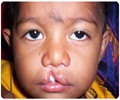Phenylketonuria
An inherited disorder of the amino acid metabolism, it is the most common inherited metabolic disease affecting brain development. It affects nearly one in 10,000 newborns in the United States and Europe. It is more frequent among certain
In Phenylketonuria, the metabolic disorder is the inability to convert a substance called phenylalanine to tyrosine due to absence or deficiency of an enzyme called phenylalanine hydroxylase. The defect in phenylketonuria can be represented as follows:
Phenylalanine hydroxylase enzyme (Absent or deficient)
↑
Phenylalanine Tyrosine
↓
No conversion due to enzyme deficiency
↓
Excessive accumulation of phenylalanine in blood and body fluids
↓
Metabolic disorder
↓
Phenyl ketonuria
There are no obvious clinical signs or symptoms soon after birth. After two or three months, there is clear-cut deterioration of the central nervous system. Children with phenylketonuria exhibit symptoms of hyperactivity, agitation, violent and destructive behavior. Some of them never sit, walk or develop normal muscle and bladder control. More than half of them die before age 30 if left untreated.










